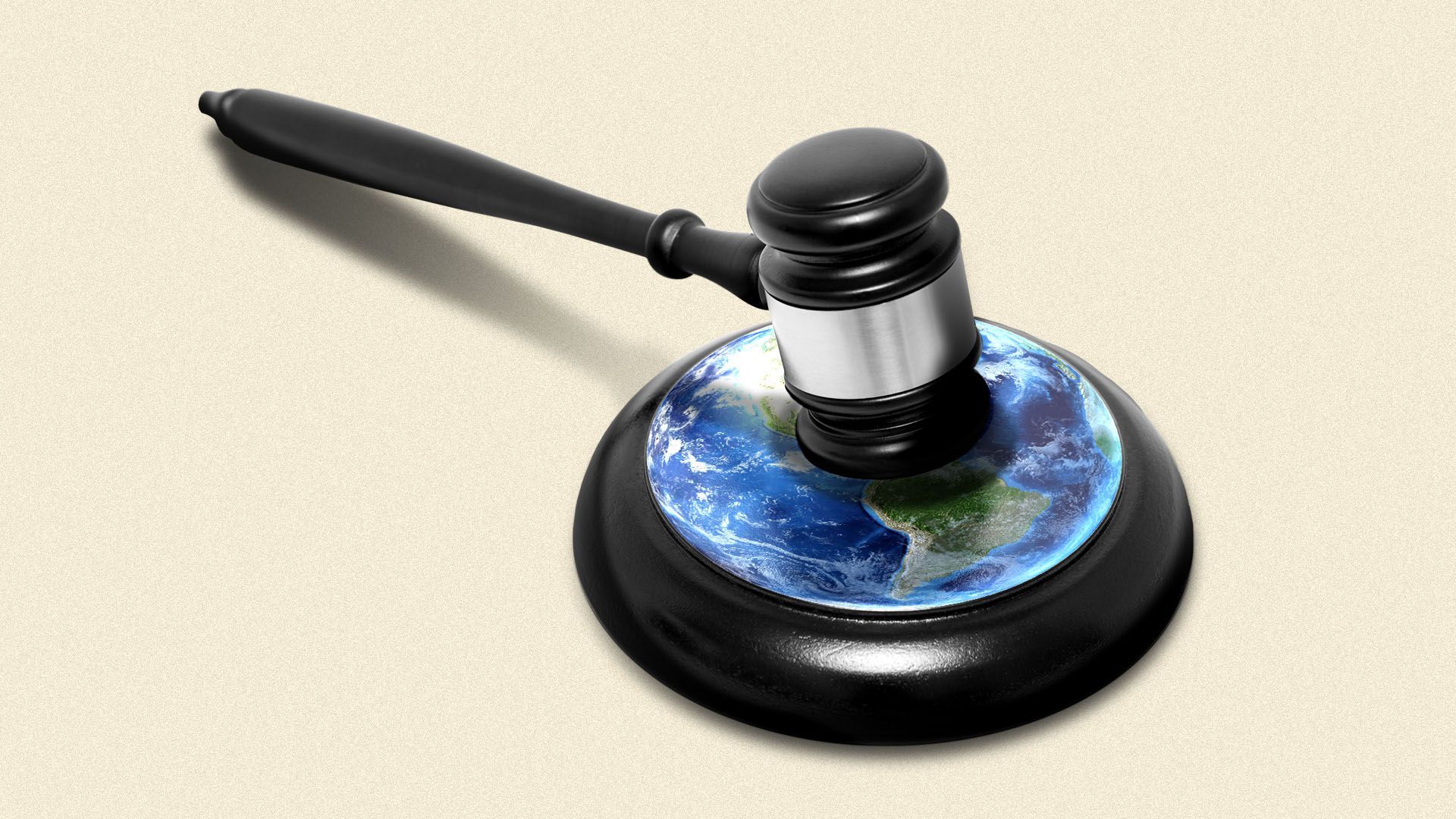| | | | | | | Presented By Chevron | | | | Generate | | By Ben Geman ·Sep 28, 2020 | | Good morning. Today's Smart Brevity count: 1,300 words, 5 minutes. Amy Harder is taking a well-deserved break this Monday. Tonight on "Axios on HBO": - Jonathan Swan presses Bob Woodward on why he said President Trump is the "wrong man for the job." (clip)
- Planned Parenthood president Alexis McGill Johnson and Susan B. Anthony List president Marjorie Dannenfelser outline what life could look like in a post-Roe v. Wade world.
- Brookings fellow Andre Perry talks about the racial wealth gap.
Tune in at 11 pm ET/PT on all HBO platforms. 🎵And Neil Young & Crazy Horse's "Ragged Glory" turned 30 this month, so we'll open the edition by hoping the daylight will soon be breaking... | | | | | | 1 big thing: Pondering a reshaped SCOTUS |  | | | Illustration: Sarah Grillo/Axios | | | | Let's explore how Amy Coney Barrett's likely ascension to the Supreme Court could affect climate policy beyond shoving the court rightward in the abstract. Catch up fast: On Saturday, President Trump nominated Barrett, a judge on the 7th Circuit Court of Appeals, to replace the late Justice Ruth Bader Ginsburg. Senate Republicans appear to have the votes to confirm her. Why it matters: If Joe Biden wins the presidential election, his regulations and potential new climate laws would face litigation that could reach the high court. - If Trump wins, ongoing cases over his dismantling of Obama-era policies could also reach SCOTUS.
- Whoever wins, a court with a 6-3 conservative majority will issue rulings that undoubtedly have ripple effects.
Between the lines: Here are a few areas to watch... 1. Agency powers. Several analysts point to Barrett's writings that suggest support for "non-delegation doctrine," a legal theory that massively restricts how much power Congress can hand off to executive agencies. - A related area: She could take a narrow view of the "Chevron deference," or the idea agencies deserve running room when statutes are vague or silent on a topic.
- Both matter when it comes to using the Clean Air Act to tackle global warming, because the 50-year-old law does not directly address the topic.
- "Broad policy choices made by EPA to regulate greenhouse gases aggressively under the Clean Air Act are going to be met with serious skepticism," says UCLA law professor Ann Carlson, who views Barrett's ascension as a potential tipping point on non-delegation doctrine.
2. Precedents. Carlson and others point to Barrett's past writings on stare decisis — the idea that past court holdings should be upheld — to argue that she's open to revisiting past rulings. - It's getting a lot of attention in light of Roe v. Wade, but it's also worth keeping an eye on Massachusetts v. EPA, the 2007 case that blessed federal regulation of planet-warming gases.
- "She seems to be not fully wedded to the idea" of stare decisis, says Carlson, who believes it's plausible the ruling could be overturned, but stopped well short of predicting it.
3. Standing. E&E News writes that while Barrett's judicial record on energy and the environment is slender, she has taken a "narrow view of public interest groups' power to sue." - Carlson made the same point in our interview, and notes that a high court setting new limits on who's able to bring cases "could really upend the environmental movement."
Yes, but: "Her record is not deep on these questions, so we are to some degree reading tea leaves," Carlson says. |     | | | | | | Bonus quote: Barrett and climate law | | I also asked Harvard Law School's Richard Lazarus about whether the more conservative court might upend Massachusetts v. EPA. He thinks it's quite unlikely. "While the Court sometimes overrules it constitutional rulings, it almost never overrules its rulings on the meaning of federal statutes. I don't think they would do it here." |     | | | | | | 2. Breaking: A big shale deal | | The oil-and-gas producers Devon Energy and WPX Energy are merging in a roughly $2.6 billion all-stock transaction that comes as U.S. producers are struggling with depressed prices and demand. Why it matters: The deal between two companies active in the prolific Permian Basin of Texas and New Mexico will help create economies of scale and improved margins, they said this morning. - The move "accelerates Devon's transition to a business model that prioritizes free cash ow generation over production growth," they said of the combined company, which will retain the Devon name.
- The merger creates one of the largest shale producers in the country, with current combined production of 277,000 barrels per day.
- Reuters and the Wall Street Journal reported on the deal over the weekend.
The big picture: Analysts have been predicting that the pandemic, combined with the already challenging economics of shale, could spur new consolidation in the U.S. oil patch. - In July, Chevron announced a $5 billion deal to acquire Noble Energy, though that deal wasn't just about shale — it also gave Chevron key natural gas assets in the Mediterranean Sea.
The intrigue: There's an election angle here too. - Bloomberg points out that Devon has a greater share than WPX of holdings on federal lands, and Biden has vowed to curtail development in those areas.
- "A deal with WPX would ... address Devon's exposure to federal acreage, according to Gabe Sorbara, an analyst at Siebert Williams Shank & Co. LLC."
- They report that "Devon has been fielding analyst questions for months about the potential impact of a Biden presidency."
Go deeper: Why U.S. oil production won't soar again soon |     | | | | | | A message from Chevron | | Chevron is investing in CO2 capture and storage | | |  | | | | We're taking action to address CO2 emissions by reducing the carbon intensity of our operations. We've spent over $1 billion building one of the world's largest integrated carbon capture and storage facilities, capable of capturing up to 4 million tons a year. Learn more. | | | | | | 3. Taking China's vow seriously but not literally | | Source: Giphy Sorry for the silly headline, but three pieces crossed my screen making the case that China's new climate pledges are a really big deal despite huge questions around implementation. Catch up fast: President Xi Jinping told the UN last week that China's emissions would peak before 2030, and that the world's largest emitter would achieve "carbon neutrality" by 2060. The big picture: Vance Wagner, a former State Department climate official writing in China Dialogue, says it's important that the words came from Xi personally as that gives it a clear priority. His other reasons why it's "huge news" are... - It's unilateral, as opposed to prior commitments made with the U.S. and Europe.
- The two targets work together to stem concern that the prior pledge — to peak by 2030 (not before) — would simply bring a plateau thereafter.
- It will ratchet up pressure on other large emitting countries.
The intrigue: Meanwhile, writing in Foreign Policy, Columbia University's Adam Tooze includes these points... - "Now the pressure will be on India, long China's partner in resisting calls from the West for firm commitments to decarbonization, to make a similarly bold climate announcement."
- He also notes that even if Biden wins, the American global posture will still be viewed with skepticism. "America's democracy is not in a position to make credible commitments."
What's new: Via Bloomberg, a top Chinese research university laid out a plan yesterday for how the 2060 target could theoretically be met. - That's significant because it's the "first blueprint from a government-affiliated group" on the matter, they report.
|     | | | | | | 4. Oil trading heavyweight forms renewables arm |  | | | Illustration: Rebecca Zisser/Axios | | | | The Trafigura Group, a giant trader of oil and other commodities, is forming a new company to invest in renewables and energy storage projects worldwide. Driving the news: Nala Renewables is a joint venture with the fund manager IFM Investors. They hope to develop 2 gigawatts worth of projects over the next five years. Why it matters: "As the world shifts away from fossil fuels, big oil and gas traders are starting to reposition their businesses and are looking to invest in more sustainable energy sources," notes the Financial Times, which first reported the move. - It's hardly just traders. Huge drilling services companies like Schlumberger have been launching new clean energy divisions and investments.
How it works: The new company will look to build and operate renewables projects in markets where Trafigura is already active, notably Europe, Asia and some emerging markets, they said. - The joint venture will also develop projects next to Trafigura's holdings in mining, port and infrastructure in order to directly provide some of them renewable power, the announcement states.
|     | | | | | | 5. The long goodbye for internal combustion cars |  | | | Illustration: Eniola Odetunde/Axios | | | | Gasoline-powered cars may be going the way of the woolly mammoth, even if it will take decades to replace them and seems hard to fathom today Axios' Joann Muller reports. The big picture: Internal combustion engines (ICEs) have powered automobiles for more than 100 years. - But the shift to electric vehicles, slow to materialize at first, is now accelerating due to tightening government policies, falling costs and a societal reckoning about climate change.
Driving the news: California said last week it plans to phase out sales of conventional new cars by 2035. - Gov. Gavin Newsom's planned rules no doubt face a giant legal fight and could depend heavily on the election outcome and the shape of the Supreme Court.
- The rest of the world is far ahead, with at least 15 countries already adopting plans to phase out new gasoline cars and others adopting strict policies to spur EV adoption.
- "Europe and China have woken up to the fact that [the combustion engine] is dead," Arndt Ellinghorst, automotive analyst at Bernstein Research, told the Wall Street Journal. "Now, it looks like the U.S. is waking up."
Read more |     | | | | | | A message from Chevron | | Chevron is investing in CO2 capture and storage | | |  | | | | We're taking action to address CO2 emissions by reducing the carbon intensity of our operations. We've spent over $1 billion building one of the world's largest integrated carbon capture and storage facilities, capable of capturing up to 4 million tons a year. Learn more. | | | | | | Axios thanks our partners for supporting our newsletters.
Sponsorship has no influence on editorial content. Axios, 3100 Clarendon Blvd, Suite 1300, Arlington VA 22201 | | | You received this email because you signed up for newsletters from Axios.
Change your preferences or unsubscribe here. | | | Was this email forwarded to you?
Sign up now to get Axios in your inbox. | | | | Follow Axios on social media:    | | | | | |












